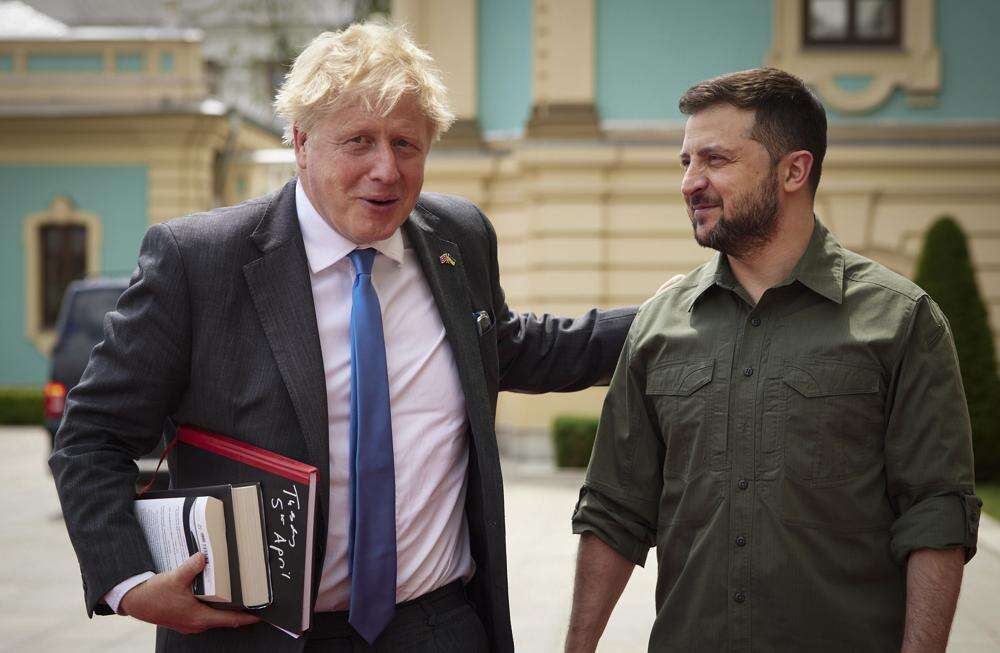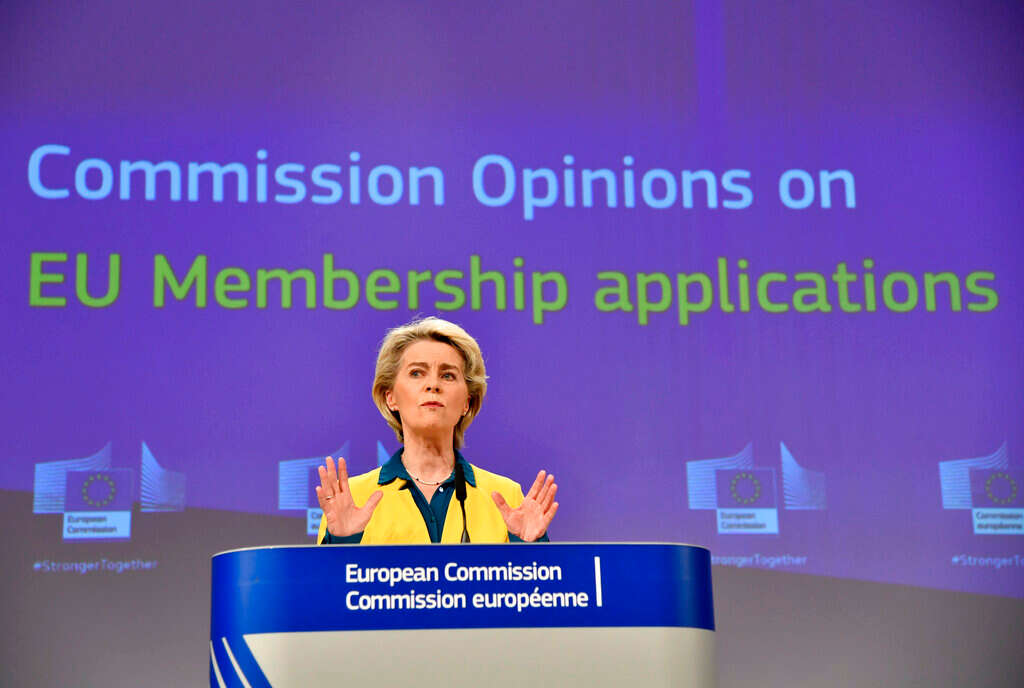Russia's war in Ukraine could take years, NATO Secretary-General Jens Stoltenberg told a German weekly newspaper over the weekend, adding that the supply of state-of-the-art weaponry to Ukrainian troops would increase the chance of liberating the Donbas region from Russian control.
"We must prepare for the fact that it could take years. We must not let up in supporting Ukraine," Stoltenberg told Bild am Sonntag. "Even if the costs are high, not only for military support, also because of rising energy and food prices."
Follow Israel Hayom on Facebook, Twitter, and Instagram
A NATO summit in Madrid later this month is expected to approve an assistance package for Ukraine that will help the country with the move from old Soviet-era weaponry to NATO standard gear, Stoltenberg said earlier last week.
Ukraine vowed on Saturday to prevail against Moscow as it fought Russian assaults near a key eastern city and multiple locations came under shell and missile attack.
Russian forces were defeated in an attempt to storm Ukraine's capital Kyiv in March. Russia has since refocused on the Donbas region in the eastern part of Ukraine.
Meanwhile, the European Union's executive arm on Friday recommended putting Ukraine on a path to membership, a symbolic boost for a country fending off the Russian onslaught that is killing civilians, flattening cities and threatening its very survival.
In another show of Western support, British Prime Minister Boris Johnson met with Ukrainian President Volodymyr Zelenskyy in Kyiv to offer continued aid and military training.

The European allies' latest embrace of Ukraine marked another setback for Russian President Vladimir Putin, who launched his war nearly four months ago, hoping to pull his ex-Soviet neighbor away from the West and back into Russia's sphere of influence.
At Russia's showpiece economic forum in St. Petersburg on Friday, Putin said Moscow "has nothing against" Ukraine joining the EU, because it "isn't a military organization, a political organization like NATO." He also reprised his usual defense of the war, alleging it was necessary to protect people in parts of eastern Ukraine controlled by Moscow-backed rebels and to ensure Russia's own security.
Johnson's trip to Kyiv followed one Thursday by the leaders of Germany, France, Italy and Romania, who pledged to support Ukraine without asking it to make any territorial concessions to Russia.
"We are with you to give you the strategic endurance that you will need," Johnson said on his second visit to the country since the Feb. 24 start of the war. Although he did not detail the aid, he said Britain would lead a program that could train up to 10,000 Ukrainian soldiers every 120 days in an unspecified location outside the country.
The training program could "change the equation of this war," he said. Ukraine has been taking heavy casualties in fighting in the east.
"I completely understand why you and your people can make no compromise with Putin because if Ukraine is suffering, if the Ukrainian troops are suffering, then I have to tell you that all the evidence is that Putin's troops are under acute pressure themselves and they are taking heavy casualties," he said. "Their expenditure of munitions, of shells and other weaponry, is colossal."
Since his April visit, "the Ukrainian grit, determination, and resilience is stronger than ever, and I know that unbreakable resolve will long outlive the vain ambitions of President Putin," he said.

Johnson said the UK will work to intensify the sanctions on Russia. He praised the resilience of Ukrainians and how "life is coming back to the streets" of Kyiv, but noted that "only a couple of hours away, a barbaric assault continues. Towns and villages are being reduced to rubble."
Zelenskyy gave Johnson a tour of a monastery where they lit candles and the British leader received an icon. They placed flowers at an outdoor memorial wall displaying photos of soldiers who fell in fighting in 2014, viewed an exhibit of damaged, rusting Russian weapons, and greeted cheering crowds.
"We have a common view of the movement toward Ukraine's victory. I'm grateful for the powerful support!" Zelenskyy said on Telegram.
The possibility of membership in the EU, created to safeguard peace on the continent and serve as a model for the rule of law and prosperity, fulfills a wish of Zelenskyy and his Western-looking citizens.
The European Commission's recommendation that Ukraine become a candidate for membership will be discussed by leaders of the 27-nation bloc next week in Brussels. The war has increased pressure on EU governments to fast-track Ukraine's candidacy, but the process is expected to take years, and EU members remain divided over how quickly and fully to welcome new members.

Political and military support from Western countries has been key to Ukraine's surprising success against larger and better-equipped Russian forces. Zelenskyy has also clamored for additional immediate support in the form of more and better weapons to turn the tide in the industrial east, known as the Donbas.
In St. Petersburg, Putin decried the sanctions imposed on Russia by the US and its allies as "insane and, I would say, reckless."
"The calculation was understandable: to impudently, with a swoop, crush the Russian economy by destroying business chains, forcing the withdrawal of Western companies from the Russian market, freezing domestic assets, hitting industry, finance, and the people's standard of living. It didn't work," he said.
Russian forces, as stated, have switched their focus to the Donbas after a series of setbacks early in the war, including the failure to seize Ukraine's capital. The Ukrainian military said Moscow's troops kept up relentless attacks on Sloviansk and Sievierodonetsk, the focus of recent fighting. The military claimed Ukrainian forces pushed Russian fighters out of the village of Bohorodychne, north of Sloviansk.
Russia and its allies say they have taken about half of Donetsk and nearly all of Luhansk – the two regions that make up the Donbas. Sievierodonetsk and surrounding villages are in the last pocket of Luhansk region still in Ukrainian hands.
Subscribe to Israel Hayom's daily newsletter and never miss our top stories!
"The Russians are pouring fire on the city," said Luhansk Gov. Serhiy Haidai. "It's getting harder and harder for us to fight in Sievierodonetsk, because the Russians outnumber us in artillery and manpower, and it's very difficult for us to resist this barrage of fire."
The constant shelling made it impossible for 568 people, including 38 children, sheltering in the Azot chemical plant in the city to escape, he said. Russian forces have destroyed all three bridges leading from the city, but Haidai said it still had not been fully blocked off.
Moscow's envoy for Russia-backed separatists who control much of the territory around Sievierodonetsk said an evacuation from the Azot plant still could take place. Rodion Miroshnik of the self-proclaimed Luhansk's People's Republic said on social media that Russian troops and separatists are "ready to consider options for opening a humanitarian corridor for the exit of civilians, but subject to strict adherence to the ceasefire."
Earlier this week, Miroshnik accused Kyiv of trying to disrupt civilian evacuations from Azot, a claim vigorously denied by Ukrainian officials.




